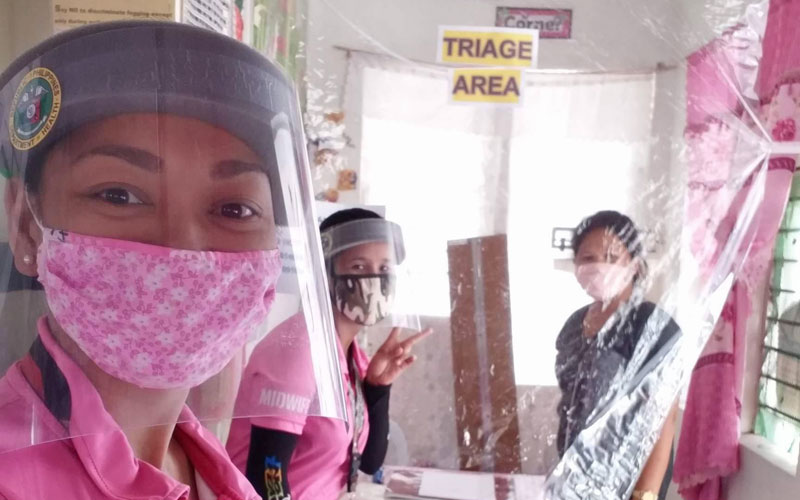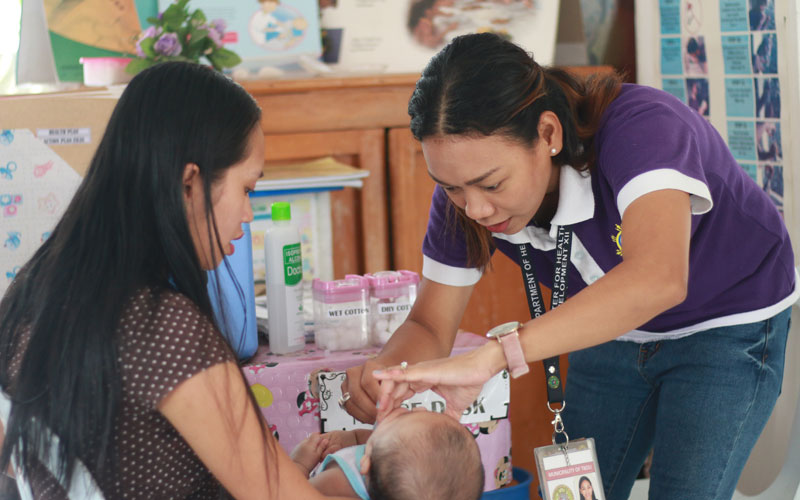By Ramon Lucas Jimenez
When the pandemic struck the Philippines in March 2020, Lenny Lyn, 27, was one of many frontline workers to suit up to serve and protect her country from the virus.
As a government health worker, Lenny is monitoring
COVID-19 cases in her community. She scans temperatures at a major intersection, and in a local triage centre she interviews people with cough and cold symptoms, supporting identified high-risk individuals with regular monitoring.
 Lenny is working alongside fellow health care workers in her community to monitor for cases of COVID-19. Photo: Lenny Lyn
Lenny is working alongside fellow health care workers in her community to monitor for cases of COVID-19. Photo: Lenny Lyn
“Being a frontliner is a challenging task especially when the enemy is invisible,” she shares. “I am worried especially because I have an infant waiting for me at home. But I need to take on this task because it is where I am most needed.”
Support hidden heroes like Lenny
Lenny’s sense of service for others is rooted from her childhood. She is the youngest of three siblings. Both of her parents are farmers who didn’t earn a regular income. Putting her and her siblings through school, especially when they reached college age, was a challenge.
It was a blessing for the family when World Vision supported Lenny’s education.
As a sponsored child, she grew up with a keen awareness of what it means to be generous and to give back.
It is for this same reason she studied midwifery and nursing at college. Because she received the gift of sponsorship, she wants to pay it forward by helping others. Someday, she would like to become a doctor.
“Thank you to my sponsor, Barbara from Canada, for supporting my education. It was the push that I needed to have a big dream and work hard for it,” the former sponsored child says.
Before the pandemic, she worked as a village health worker, traveling hours over rough terrain each week to rural communities where access to medical services is limited. She provided prenatal care, infant care such as immunization, and regular check-ups for new moms.
 Before the pandemic, Lenny, a midwife and nurse, provided medical care in rural communities with limited access to health services. Photo: Ramon Lucas Jimenez
Before the pandemic, Lenny, a midwife and nurse, provided medical care in rural communities with limited access to health services. Photo: Ramon Lucas Jimenez
But when she was called on to be part of the COVID-19 government health response, she willingly accepted.
“I hope that the country will recover from this pandemic and everything will get back to normal,” she says. “For now, I will do my part to achieve the goal of a country that is free from COVID-19.”
Previously, the province where Lenny lives recorded three confirmed cases of COVID-19 but all are considered negative after a retest. As of now, there are no cases of COVID-19 in her community.
Like Lenny Lyn, the global pandemic has transformed millions of ordinary people into heroes, quietly stepping forward to help the most vulnerable. Without fanfare or accolades, they put themselves at risk on the frontlines of the medical field, or by simply delivering groceries to those more vulnerable to the virus. Why? Because Love compels us all to help our neighbours, the stranger, and “the least of these.”
Learn how ordinary people like Lenny are having an extraordinary impact in the face of a global pandemic.